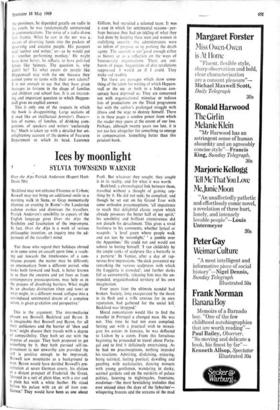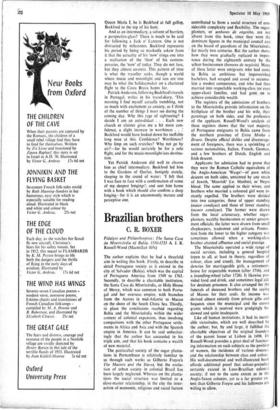Ices by moonlight
SYLVIA TOWNSEND WARNER
Over the Alps Patrick Anderson (Rupert Hart- Davis 50s) `Beckford may not enhance Florence or Lisbon; Boswell may not bring an-additional smile to a morning walk in Siena, or Gray momentarily illumine an evening in Rome'—the Landorian cadence evokes and dismisses the travellers. Patrick Anderson's sensibility to aspects of the English language gives Over the Alps the flexibility and fascination of the impromptu. In fact, Over the Alps is a work of serious philosophic intention, an inquiry into the ad- justment of the traveller's mind.
`For those who regard their holidays abroad as in some sense an assault upon time, a reach- ing out towards the timelessness of a con- tinuous present. the matter may be different; an intermediary from a different period, who looks both forward and back, is better known to us than the ancients and yet frees us from contemporary preoccupations, may help us in the process of dissolving barriers. What might be an absolute distinction (then and now) or what might, in a different mood, collapse into a sun-induced sentimental dream of a complete union, is given gradation and perspective.'
This is the argument. The intermediaries' chosen are Boswell, Beckford and Byron. It is imaginable that Boswell and Byron, for all their unlikeness and the barrier of 'then and now,' might discuss their travels with a degree of compatibility. They both set out with the Impetus of escape. They both proposed to get something by it, they both pursued self-im- provement (a not unworthy aim provided the self is positive enough to be improved). Boswell saw mountains as a background to men. Byron would have derided Boswell's pre- sentation at seven German courts, his elation at a distant prospect of Frederick the Great, dressed in a suit of plain blue, with a star and a plain hat with a white feather. He stood before his palace with an air of iron con- fidence.' They would have been as one about Paoli. But whatever they sought, they sought it in its reality, and for what it was worth.
Beckford, a chronological link between them, travelled without a thought of gaining any- thing by it. He did not seek; he complied; and though he set out on his Grand Tour with some orthodox preconceptions, 'all impatience to reach that delightful classic region which already possesses the better half of my spirit,' his sensibility and brilliant attentiveness did not disturb his detachment. This gives a vivid freshness to his comments, whether lyrical or waspish: 'a level green where people walk and eat ices by moonlight,' a jumble over the Appenines.' He could not and would not submit to boring himself. 'I ran childishly by the ample ranks of sculpture like a butterfly in a parterre.' In Venice, after a day of rap- turous first impressions, 'the dusk prevented my remarking- the various sculptures with which the Loggietta is crowded'; and further dusks fell as conveniently, releasing him into the un- impeded, ungpidebooked territory of his own imagination.
Four years later the ultimate scandal had broken. Society, long exasperated by the thorn' in its flesh and a trifle anxious for its own reputation, had gathered for the social kill. Beckford was 'dropped.'
Moral romanticism would like to find the traveller in Portugal a changed man. He was not. This time he had not even complied. Setting out with a practical wish to investi- gate his estates in Jamaica, he was deflected to Lisbon by a storm. From this fortuitous beginning he proceeded to travel about Portu- gal and to find it deliciously entertaining. As he had no preconceptions, nothing impeded his reactions. Admiring, disdaining, ,enjoying, being satirical, feeling poetical, dawdling and guzzling- with ecclesiastics, dancing minuets with young gentlemen, wandering in dusky, scented gardens and on the outskirts of palace politics, listening to nightingales, fountains, modinhas=the most bewitching melodies that ever existed since the days of the Sybarites= whispering breezes apd the screams of the mad Queen Maria I, he is Beckford at full gallop, Beckford to the top of his bent.
And as an intermediary, a solvent of barriers, a perspective-glass? There is much to be said for following a Jack o' Lantern. One is not distracted by milestones. Beckford represents his period by being so markedly askew from it that the actuality of his `now' stings one into a realisation of the `then' of his contem- poraries, the `now' of today. They do not fuse, but they almost co-exist. This pattern of time is what the traveller seeks, though a world where music and moonlight and ices are 'one may be what the holidaymaker on a chartered flight to the Costa Brava hopes for.
Patrick Anderson, following Beckford's travels in Portugal, writes in his travel-diary, `This morning I find myself actually trembling, not so much with excitement as anxiety, as I think of the number of things I must see during the coming day. Why this rage of sightseeing? I decide I am an auto-didact . . . Each new church or cloister gives me a bit more con- fidence, a slight increase in worthiness . . Beckford would have looked down his ineffable long nose at this. Confidence? Worthiness? Why limp on such crutches? Why not go by air?—for he would certainly be for a solo flight, and for the music-moonlight-ices destina- tion.
Yet Patrick Anderson did well to choose him as chief intermediary. Beckford led him to the Gardens of Queluz, benignly stately, sleeping to the sound of water : 'I felt that I was face to face with a confirmation of some of my deepest longings'; and sent him home with a book which should also confirm a deep longing—for it is an uncommonly mature and perceptive one.







































 Previous page
Previous page